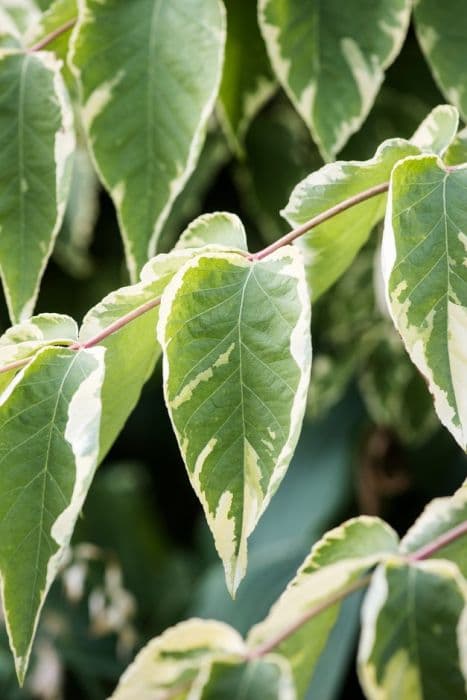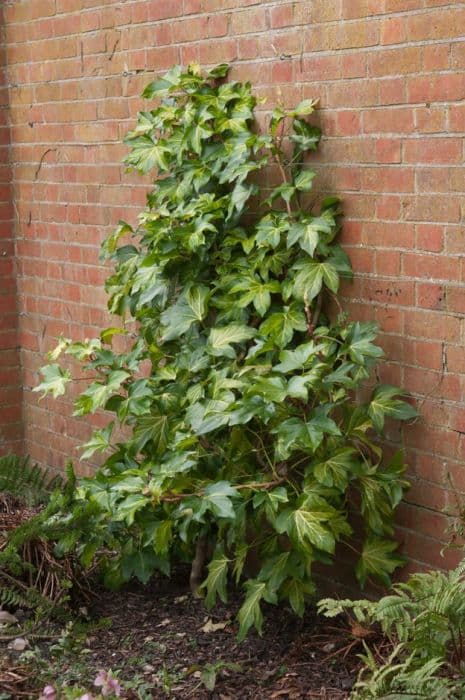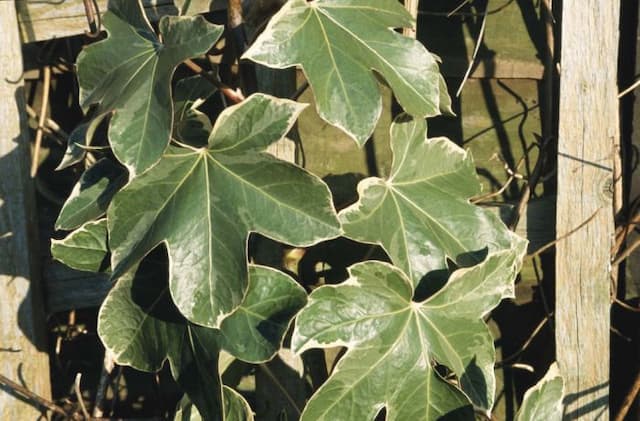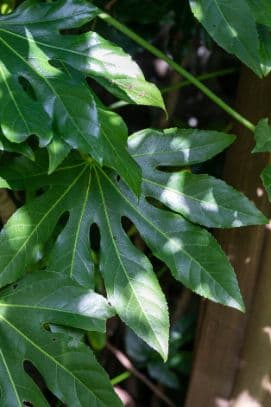English Ivy Hedera helix 'Melanie'
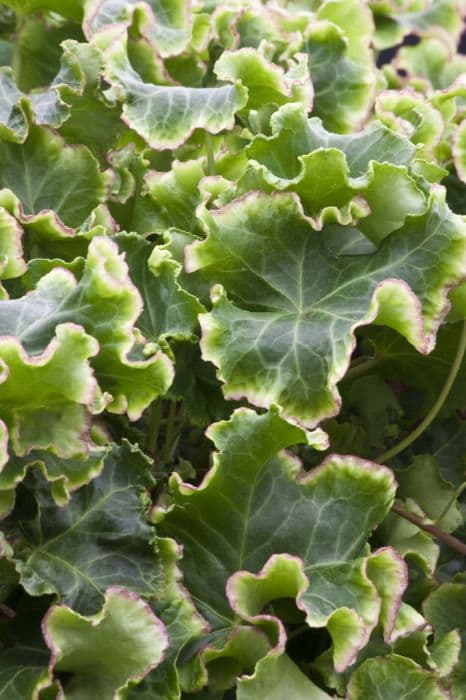
ABOUT
The plant Hedera helix 'Melanie', known commonly as English ivy, boasts a striking aesthetic that characterizes both its unique and classic ivy appeal. This particular variety showcases leaves that are generally smaller than the typical English ivy. They have a lush, deep-green hue that sets a backdrop for the pronounced white to creamy-yellow veining. Each leaf is usually shaped with three to five lobes, giving them a somewhat star-like silhouette, and the edges may be slightly ruffled or curled, adding texture and visual interest. 'Melanie' has a dense, trailing habit, with stems that bear close-knit foliage, creating a full and robust appearance. This lushness makes it an excellent choice for filling in spaces with greenery or even for cascading down from hanging baskets or trailing along a trellis. As it matures, the leaves maintain their ornate appearance, though they might exhibit some variance in the patterning of the variegation, further adding to the plant's charm. Overall, English ivy 'Melanie' commands a sense of elegance and vitality, which when coupled with its classic ivy characteristics, forms a plant that is both familiar and refreshingly unique in appearance.
About this plant
 Names
NamesFamily
Araliaceae.
Synonyms
English Ivy, Common Ivy, European Ivy.
Common names
Hedera helix 'Melanie'.
 Toxicity
ToxicityTo humans
English ivy, including the variety 'Melanie', contains compounds that can be toxic to humans if ingested. These compounds include saponins and polyacetylene compounds. Ingesting parts of the plant may lead to gastrointestinal symptoms including nausea, vomiting, diarrhea, and abdominal pain. In some cases, skin contact can also cause dermatitis or irritation due to these irritant substances. There is also a risk of contact dermatitis from handling the plant without gloves.
To pets
English ivy is also toxic to pets such as dogs and cats. The toxic principles, primarily saponins, can cause similar symptoms in pets as in humans if ingested. These include vomiting, abdominal pain, hypersalivation, and diarrhea. In severe cases, ingestion can lead to more serious conditions such as breathing difficulties, weakness, or coma. It is advisable to prevent pets from chewing on or ingesting any part of this plant.
 Characteristics
CharacteristicsLife cycle
Perennials
Foliage type
Evergreen
Color of leaves
Varies
Height
6-10 feet (1.8-3 meters)
Spread
6-10 feet (1.8-3 meters)
Plant type
Climber
Hardiness zones
5-9
Native area
Europe
Benefits
 General Benefits
General Benefits- Ornamental Value: Hedera helix 'Melanie', also known as English ivy, adds aesthetic beauty to landscapes and indoor spaces with its lush, trailing foliage.
- Low Maintenance: English ivy requires minimal care once established, making it ideal for busy gardeners or those new to plant care.
- Versatility: This plant can be grown both indoors and outdoors, in hanging baskets, as ground cover, or as a climbing vine with proper support.
- Shade Tolerance: English ivy thrives in shaded areas where other plants might struggle, making it a good option for less sunny spots.
- Soil Erosion Control: When planted outdoors, the dense growth of English ivy can help prevent soil erosion by stabilizing the soil with its root system.
- Wildlife Habitat: When grown outdoors, English ivy can provide shelter and nesting sites for birds and other small animals.
 Medical Properties
Medical Properties- Expectorant: English Ivy has been traditionally used to help relieve cough and congestion.
- Antispasmodic: May help relieve bronchial spasms.
- Anti-inflammatory: Contains saponins which have been attributed with anti-inflammatory properties.
- Antimicrobial: Research has indicated potential antimicrobial effects of English Ivy against certain pathogens.
 Air-purifying Qualities
Air-purifying QualitiesThis plant is not specifically known for air purifying qualities.
 Other Uses
Other Uses- Photography and Film Prop: English ivy 'Melanie' can create picturesque backdrops or convey an atmosphere of aged beauty when used as a set decoration.
- Craft Material: The vines and leaves can be woven into wreaths or used in other botanical craft projects for a touch of natural greenery.
- Educational Tool: English ivy 'Melanie' can be studied in botany classes for its trailing vine growth habit and leaf structure.
- Noise Reduction: Dense growth of this ivy can help dampen noise when grown against walls in urban environments.
- Cosmetic Use: Leaves may be included in natural dyes for textiles, imparting subtle colors and patterns.
- Fauna Support: Provides shelter and breeding grounds for certain insects and birds when used in garden landscaping.
- Theme Gardens: English ivy 'Melanie' is suitable for fairy or fantasy-themed gardens due to its enchanting appearance.
- Culinary Presentation: Though not edible, the leaves can be used as a decorative garnish for plating in upscale restaurants.
- Seasonal Decoration: The ivy can be incorporated into festive decor for holidays like Halloween or Christmas, often fashioned into garlands or draped over surfaces for a seasonal look.
- Privacy Screening: When grown on trellises, English ivy 'Melanie' can create a living screen for privacy in balconies or patios.
Interesting Facts
 Feng Shui
Feng ShuiThe English Ivy is not used in Feng Shui practice.
 Zodiac Sign Compitability
Zodiac Sign CompitabilityThe English Ivy is not used in astrology practice.
 Plant Symbolism
Plant Symbolism- Connection and Friendship: English ivy, such as the Hedera helix 'Melanie', often symbolizes deep connections and friendships because of its tendency to cling and grow along with structures and trees, representing the idea of sticking with someone through thick and thin.
- Fidelity: This plant is also a symbol of fidelity or faithfulness, as it stays green throughout the year and is hard to remove once it has established itself, paralleling the commitment in a lasting relationship.
- Eternal Life: The evergreen nature of Hedera helix signifies eternity and continuity as it remains lush throughout the seasons, symbolizing the human desire for eternal life or remembrance.
- Protection: In some traditions, ivy is thought to ward off negative energy and evil spirits, offering protection to the house or garden where it grows.
- Survival and Resilience: English ivy's robust nature that allows it to thrive in various conditions speaks to the qualities of survival and resilience, symbolizing one’s ability to overcome difficult situations.
- Intellectual Growth: Given its association with historic institutions like the famous Ivy League colleges, ivy can symbolize the pursuit of knowledge and intellectual growth.
 Water
WaterEnglish Ivy 'Melanie' should be watered thoroughly when the top inch of soil feels dry to the touch, which typically is once every week for indoor plants, but this can vary based on environmental conditions. During watering, it is important to ensure that water seeps through the drainage holes at the bottom of the pot. For outdoor plants, they may need watering less frequently due to rainfall and cooler temperatures, so monitor the soil moisture level before watering. Generally, giving the plant about half a gallon of water at each watering session indoors should be sufficient, but always adjust depending on the plant's response and the current season.
 Light
LightEnglish Ivy 'Melanie' thrives best in bright, indirect light but can also adapt to medium light conditions. Avoid direct sunlight as it can scorch the leaves. A north or east-facing window is typically an ideal spot for this plant, shielding it from the harsh afternoon sun while providing enough light for growth.
 Temperature
TemperatureEnglish Ivy 'Melanie' prefers a cool to moderate temperature range, thriving between 50 and 70 degrees Fahrenheit. It can tolerate minimum temperatures down to about 30 degrees Fahrenheit but will suffer if exposed to prolonged periods of frost or cold. The ideal indoor temperature is around 60 to 65 degrees Fahrenheit for optimal growth.
 Pruning
PruningEnglish Ivy 'Melanie' should be pruned to control its size, shape, and to encourage fuller growth. It is best to prune in the spring or early summer when the plant is actively growing. Cut back any overgrown or unwanted vines, and remove any dead or damaged foliage to maintain the plant's health. Pruning can be done every few months or as needed to keep the plant tidy.
 Cleaning
CleaningAs needed
 Soil
SoilEnglish Ivy 'Melanie' thrives in well-draining, loamy soil that is rich in organic matter. A soil pH of 5.5 to 6.5 is ideal, so slightly acidic to neutral soil conditions are best for this variety. The perfect soil mix can be created by blending equal parts of garden soil, peat or coconut coir, and perlite or sand to increase aeration.
 Repotting
RepottingEnglish Ivy 'Melanie' should generally be repotted every two to three years or when it outgrows its current container. Spring is the best time for repotting to allow the plant to recover and grow into its new pot throughout the growing season.
 Humidity & Misting
Humidity & MistingEnglish Ivy 'Melanie' prefers high humidity levels, ideally between 40% to 50%. The plant can benefit from regular misting or placement on a pebble tray with water to maintain the right level of humidity around it.
 Suitable locations
Suitable locationsIndoor
Place in bright, indirect light and maintain high humidity.
Outdoor
Plant in shaded area, protect from direct sun, ensure moist soil.
Hardiness zone
5-11 USDA
 Life cycle
Life cycleEnglish Ivy 'Melanie' begins its life cycle as a dormant seed which, upon suitable conditions, germinates to form a seedling. The seedling grows into a juvenile vine with lobed leaves that can climb or spread horizontally through aerial rootlets. As it matures, this evergreen perennial enters a vegetative stage, with leaves becoming more heart-shaped, during which it continues to spread and can cover large areas if not pruned. Upon reaching maturity, it can produce small yellow-green flowers in the late summer to fall, which are typically not conspicuous. These flowers are followed by the development of berry-like fruits that are blue-black in color, mature by late winter or spring, and can be spread by birds. The plant then enters a repeated cycle of vegetative growth and reproduction as long as conditions remain suitable.
 Propogation
PropogationPropogation time
Spring-Early Summer
Propogation: The English Ivy cultivar 'Melanie' can be easily propagated through stem cuttings, which is the most popular method for this type of plant. The best time for propagation is late spring or early summer when the plant's growth is most active. To propagate, select a healthy stem and cut a 4 to 6-inch (10 to 15 cm) length just below a leaf node. Remove the lower leaves and place the cutting in a pot with well-drained potting mix or directly into water. If using soil, keep it moist until roots develop, which usually takes about 2 to 3 weeks. Once rooted, the cutting can be planted in its permanent location. This method is favored for its simplicity and high success rate.
